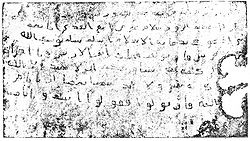
Muhammad's letters to the Heads-of-State
Encyclopedia

Treaty of Hudaybiyyah
The Treaty of Hudaybiyyah is the treaty that took place between the state of Medina and the Quraishi tribe of Mecca in March 628CE .-Background:...
, Muhammad
Muhammad
Muhammad |ligature]] at U+FDF4 ;Arabic pronunciation varies regionally; the first vowel ranges from ~~; the second and the last vowel: ~~~. There are dialects which have no stress. In Egypt, it is pronounced not in religious contexts...
decided to send letters to many rulers of the world, inviting them to Islam
Overview
Muhammad, according to the usually told Islamic historiography, sent ambassadors with such letters to HeracliusHeraclius
Heraclius was Byzantine Emperor from 610 to 641.He was responsible for introducing Greek as the empire's official language. His rise to power began in 608, when he and his father, Heraclius the Elder, the exarch of Africa, successfully led a revolt against the unpopular usurper Phocas.Heraclius'...
the emperor of Byzantium
Byzantium
Byzantium was an ancient Greek city, founded by Greek colonists from Megara in 667 BC and named after their king Byzas . The name Byzantium is a Latinization of the original name Byzantion...
, Chosroes II the emperor of Persia, the Negus
Negus
Negus is a title in Ge'ez, Tigrinya, Tigre and Amharic, used for a king and at times also a vassal ruler in pre-1974 Ethiopia and pre-1890 Eritrea. It is subsequently used to translate the word "king" in Biblical and other literature...
of Ethiopia
Ethiopia
Ethiopia , officially known as the Federal Democratic Republic of Ethiopia, is a country located in the Horn of Africa. It is the second-most populous nation in Africa, with over 82 million inhabitants, and the tenth-largest by area, occupying 1,100,000 km2...
, Muqawqis
Muqawqis
Al-Muqawqis is mentioned in Islamic history as a ruler of Egypt, who corresponded with the Islamic prophet Muhammad. He is often identified with Cyrus, Patriarch of Alexandria, who administered Egypt on behalf of the Byzantine Empire. However, this identification is challenged as being based on...
the ruler of Egypt
Egypt
Egypt , officially the Arab Republic of Egypt, Arabic: , is a country mainly in North Africa, with the Sinai Peninsula forming a land bridge in Southwest Asia. Egypt is thus a transcontinental country, and a major power in Africa, the Mediterranean Basin, the Middle East and the Muslim world...
, Harith Gassani
Harith Gassani
Harith bin Abi Shamir Al-Gassani was an Arab Christian governor of Sham which was in the domain of the Byzantine Empire. He was a contemporary of the prophet Muhammad and King of Damascus now in modern day Syria. He received a letter from Muhammad where he was invited to Islam...
the governor of Syria
Syria
Syria , officially the Syrian Arab Republic , is a country in Western Asia, bordering Lebanon and the Mediterranean Sea to the West, Turkey to the north, Iraq to the east, Jordan to the south, and Israel to the southwest....
and Munzir ibn Sawa
Munzir ibn Sawa Al Tamimi
Munzir ibn Sawa Al Tamimi was the ruler of Bahrain and Qatar during the age of the Islamic prophet Muhammad. In the 7th century AD, when Muhammad and his companions started preaching Islam throughout the world, the message of Islam was sent by Muhammad to Munzir ibn Sawa Al Tamimi.Prior to Islam,...
the ruler of Bahrain
Bahrain
' , officially the Kingdom of Bahrain , is a small island state near the western shores of the Persian Gulf. It is ruled by the Al Khalifa royal family. The population in 2010 stood at 1,214,705, including 235,108 non-nationals. Formerly an emirate, Bahrain was declared a kingdom in 2002.Bahrain is...
. The account as transmitted by Muslim historians reads as follows:
The letter to Chosroes II is similar except that it refers to Magi
Magi
Magi is a term, used since at least the 4th century BC, to denote a follower of Zoroaster, or rather, a follower of what the Hellenistic world associated Zoroaster with, which...
ans instead of the Arians
Arianism
Arianism is the theological teaching attributed to Arius , a Christian presbyter from Alexandria, Egypt, concerning the relationship of the entities of the Trinity and the precise nature of the Son of God as being a subordinate entity to God the Father...
.
————————————————————
————————————————————

